
Stephen Hawking & Zoe Saldana try to save Simon Pegg’s cat
We are on the verge of a quantum revolution. Like in the days of the space race, technology has brought an impossibly distant frontier to our doorstep. Just over 17 years ago Michael Crichton wrote a parallel universe-hopping adventure, Timeline, whose fundamental transportation technology required the advent of quantum computing – a concept that was still only theoretical at the time. Today, IBM’s five-quantum bit (or qubit) array is at the fingertips of anyone within reach of the cloud. Google is building a fifty-qubit array. Microsoft is bankrolling a brain trust that will build a quantum computer based on topological qubits. Intel is investing $50 million on spin qubit technology. The UK has announced a £270 million program, and the EU a €1 billion program, to develop quantum technologies. And even more quantum circuits are on the way; the equivalent of competing classes of space shuttles. Only these crafts aren’t meant to travel through space, or even time. They travel through the complete unknown. Qubits fluctuate between the infinite universes of possibility, their quantum states based inherently on uncertainty. And the best way to harness that seemingly unlimited computing power, and take the first steps into the quantum frontier, is through the elusive concept of entanglement.

So then, the quantum crafts are ready; the standby lights on their consoles blinking in a steady yellow cadence. What we’re missing are the curiosity-driven pilots willing to grapple with the uncertain and unpredictable.
The quantum mechanics property of entanglement was discovered by Albert Einstein, Boris Podolsky, and Nathan Rosen and soon after described in a famous 1935 paper. Einstein called it “spooky action at a distance.” Virtually all of his contemporaries, including Edwin Schrödinger who coined the term “entanglement”, and the entire subsequent generation of physicists would struggle with this paradox. Although their struggles would be necessary to arrive at this particular moment in time, this precipice, their collective and prodigious minds were, and remain to be, handcuffed by training and experiences rooted in a classical understanding of the laws of nature – derived from phenomena that can be seen or felt, either directly or indirectly. Quantum entanglement, on the other hand, presents a puzzle of a fundamentally abstract nature.

Paul Rudd & Stephen Hawking chatting it up
When Paul Rudd defeated Stephen Hawking in a game of quantum chess – a game built from the ground up with a quantum mechanical set of moves leveraging superposition and entanglement – our intent was to suggest that an entirely new generation of physicists can emerge with an intuitive understanding of entanglement, even before having to dip their toes in mathematics.
Language, Young Lady
Following up on Anyone Can Quantum, the challenges were to (1) further introduce and elaborate on quantum entanglement and (2) reach a wider audience, particularly women. Coming from a writer’s perspective, my primary concern was to make the abstract concept of entanglement somehow relatable. Popular stories, at their most basic, are told through interactions between people in relationships. Only through relational interactions can characters be challenged enough to affect a change in behavior, and as a result support a theme. Early story concepts evolved from the idea that any interaction with entanglement would result in a primary problem of miscommunication. Entanglement, in any form approaching personification, would be fully alien and incomprehensible. Language then, I decided, would become the fabric by which we could create a set of interactions between a human and entanglement.
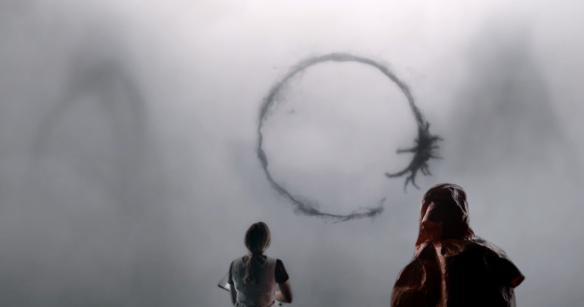
Dr. Louise Banks (Amy Adams) & Ian Donnelly (Jeremy Renner) in Arrival
This particular dynamic was tackled in the recent movie Arrival. There, the fictional linguist Dr. Louise Banks is tasked with translating the coffee-ring-stain sign language of a visiting alien civilization before one of the world’s many nervous armies attacks them and causes an intergalactic incident. In the process of decoding the dense script, the controversial Sapir-Whorf theory is brought up introducing the idea that language shapes the way people think. While this theory may or may not hold snow, I am still impressed with the notion that a shared, specific, and descriptive language is necessary to collaborate and innovate. This impression is supported by my own experience in molecular and cell biology research in which communicating new findings always requires expending a tremendous amount of energy crafting a new and appropriate set of terms, or in other words, an expansion of the language.
Marvel To The Rescue
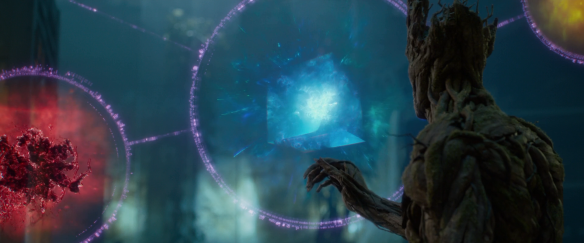
The Tesseract & Groot in Guardians of the Galaxy
To drive their building, multi-threaded Infinity Stones storyline, the Marvel Cinematic Universe (MCU) has been fortuitously bold in broaching quantum physics concepts and attempting to ground them in real science, taking advantage of the contacts available through the Science & Entertainment Exchange. Through these consultations, movies like Thor and Ant-Man have already delivered to a wide and diverse audience complex concepts such as Einstein-Rosen bridges (wormholes) and the Quantum Realm.
The Ant-Man consultation, in particular, resulted in a relationship between IQIM’s own Spyridon Michalakis (aka Spiros) and Ant-Man himself, Paul Rudd. This relationship was not only responsible for Anyone Can Quantum, but it was also the reason why Spiros was invited to be a panelist at the Silicon Valley Comic Con earlier this year, where he was interviewed by science journalist Zuberoa “Zube” Marcos of the global press outfit, El Pais, a woman who would end up playing a central role in getting Quantum Is Calling off the ground.
So the language of quantum physics was being slowly introduced to a wider, global population thanks to the Marvel films. It occurred to us that we had the opportunity to explain some of the physics concepts brought up by the MCU through the lens of quantum physics, and entanglement in particular. The one element of the MCU storylines that was most attractive to us was the Tesseract and its encased Space Stone. It was the first of the Infinity Stones introduced (in Captain America: The First Avenger) and the one that drove the plot of The Avengers, culminating in the creation of a wormhole over Manhattan. For Spiros, the solution was simple: In order to create wormholes, the exotic matter comprising the Space Stone would likely have to exploit entanglement, as described in a conjecture, dubbed “ER=EPR”, published by Leonard Susskind and Juan Maldacena in 2013.

The USS Enterprise (NCC-1701) in the Star Trek TOS episode “The Immunity Syndrome”
Finding Our Star
The remaining challenge was to find the right actress to deliver the new story. The earliest version of our story (back in June, 2016) was based on the crew of the Starship Enterprise encountering an alien creature that was the embodiment of entanglement (a.k.a The Flying Spaghetti Monster), a creature that attempted communication with Earthlings by reciting sound bytes originating from past Earth radio transmissions. In this story iteration, Chief communications officer Uhura would have used her skills to translate the monster’s message amidst rising tension (just like in Arrival).

Zoe Saldana as Lt. Nyota Uhura
In the subsequent revisions to the story we had to simplify the script and winnow down the cast. We opted to lean on Zoe Saldana’s Uhura. Her character could take on the role of captain, communications officer, and engineer. Zoe was already widely known across multiple sci-fi franchises featuring aliens (namely Star Trek, Guardians of the Galaxy, and Avatar) and her characters have had to speak in or translate those languages.
Zoe = Script
But before approaching Zoe Saldana – and at that point in time, we had no idea how to go about that – we needed to complete a script. Two other incredible resources were available to us: the voices of Dr. Hawking and Keanu Reeves; and we had to make all three work together in a unique comedy – one that did not squander the involvement of either voice, but also served to elevate the role of Zoe.
Even in the first version of the story it was my intent to have Keanu Reeves provide the voice for entanglement, expressed through the most alien sounding languages I could imagine. To compress the story to fit our budget we were forced to narrow the list of languages to two, and I chose Dothraki and Navajo. The role of Keanu’s character was to test, recruit, and ultimately invite Zoe Saldana to enter and experience entanglement in the Quantum Realm. Dr. Stephen Hawking would be the reluctant guide that helps Zoe interpret the confusing clues embedded within the Dothraki and Navajo to arrive at the ER=EPR conjecture.
As for the riddle itself, I chose to use two poems from Through the Looking Glass (and What Alice Found There), The Walrus and The Carpenter as well as Haddock’s Eyes, as the reference material, so that those savvy enough to solve even half the riddle on their own would have a further clue pointing them to the final answer.

Simon Pegg’s cat, Schrodinger (not his actual cat)
The disappearance of Simon’s cat, Schrödinger, had a tripartite function of (a) presenting an inciting incident that urged Zoe to subject herself to the puzzle-solving trial, which we called the Riddle of the Tesseract, (b) to demonstrate the risk of touching the Tesseract and the gravity of her climactic choice, and (c) invoking Schrödinger’s famous thought experiment to present the idea that, in the Quantum Realm, the cat and Zoe are both dead and alive, an uncertainty.
The story was done. And it looked good on paper. But the script was just a piece of paper unless we got Zoe Saldana to sign on.

Zuberoa Marcos
Zoe = Zube
For weeks, Spiros worked all of his connections only to come up empty. It wasn’t until he mentioned our holy quest to Zube (from El Pais and Silicon Valley Comic Con) during an unrelated Skype session that he had the first glimmer of hope, even kismet. Zube had been working on arranging an interview with Zoe for months, an interview that would be taking place three days later in Atlanta. Without even a second thought, Spiros purchased a plane ticket and was on his way to Atlanta two days later. Watching the interview take place, he heard Zoe answer one of Zube’s question about what kind of technology interested her the most. It was the transporter, the teleportation machine used by the crew of the Enterprise to shift matter to and from surfaces of alien planets. This was precisely the kind of technology we were interested in describing at a quantum level! Realizing this was the opening we needed, Zube nodded over to Spiros and made the introductions.
It turns out Zoe had been fascinated by science fiction since her early childhood, being particularly obsessed with Frank Herbert’s Dune. Moreover, she was interested in playing the role of our lead character. In the weeks that followed, communication proceeded through managers in an attempt to nail down a filming date.
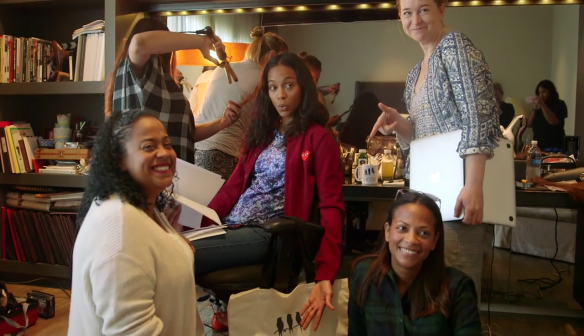
Mariel, Zoe, and Cicely Saldana
The Dangers of Miscommunication
I probably don’t need to remind you that Zoe Saldana is a core component of three gigantic franchises. That means tight schedules, press conferences, and international travel. Ultimately Zoe said that her travel commitments wouldn’t allow her to film our short. It was back to square one. We were dead in the water. The script was just a piece of paper.
However, for some reason, Spiros and Zube were not willing to concede. Zube found out about Zoe Saldana’s production company Cinestar and got in contact with coordinator Diego Gonzalez, to set up a lunch meeting. At lunch, Diego informed Zube and Spiros that Zoe really wanted to do this, but her team was under the impression that filming for our short video had to take place the week Star Trek: Beyond was to be released (Zoe was arguably busier than the POTUS during that week). Spiros informed Cinestar that we would accommodate whatever date Zoe could be available. Having that hurdle removed paved the way for a concrete film date to be set, October 25th. And now the real work began.
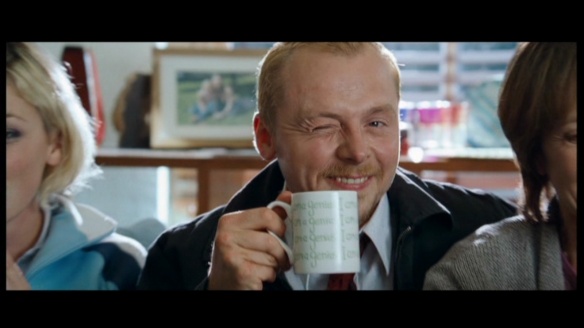
Simon Pegg in Shaun of the Dead
Finding Common Language
We had set the story inside Simon Pegg’s house and the script included voice-over dialogue for the superstar, but we had yet to even contact Simon. We had written in a part with Paul Rudd on a voicemail message. And we had also included a sixth character that would knock on the door and force Zoe to make her big decision. On top of that I had incorporated Dothraki and Navajo versions of century-old poems that had yet to be translated into those two languages. While Spiros worked on chasing down the talent, I nervously attempted to make contact with experts in the two languages.
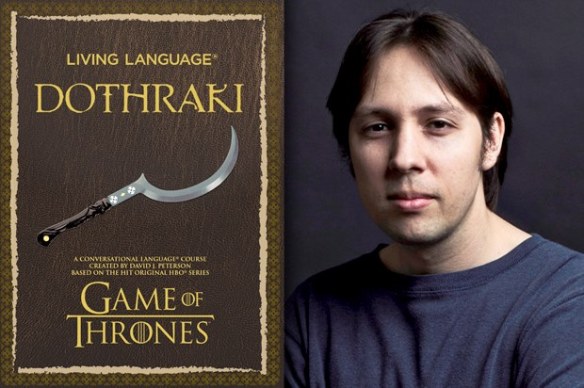
David J. Peterson
I remember watching a video of Prof. David J. Peterson, creator of the Dothraki language for HBO’s Game of Thrones, speaking at Google about the process of crafting the language. Some unknown courage surfaced and I hunted down contact information for the famous linguist. I found an old website of his, an email address, and sent and inquiry at about midnight pacific standard time on October 14th, the day before my birthday. Within 45 minutes David had responded with interest in helping out. I was floored. And I couldn’t help geeking out. But more importantly this meant we would have the most accurate translation humanly possible. And when one is working on behalf of Caltech you definitely feel the pressure to be above reproach, or unsullied ;).
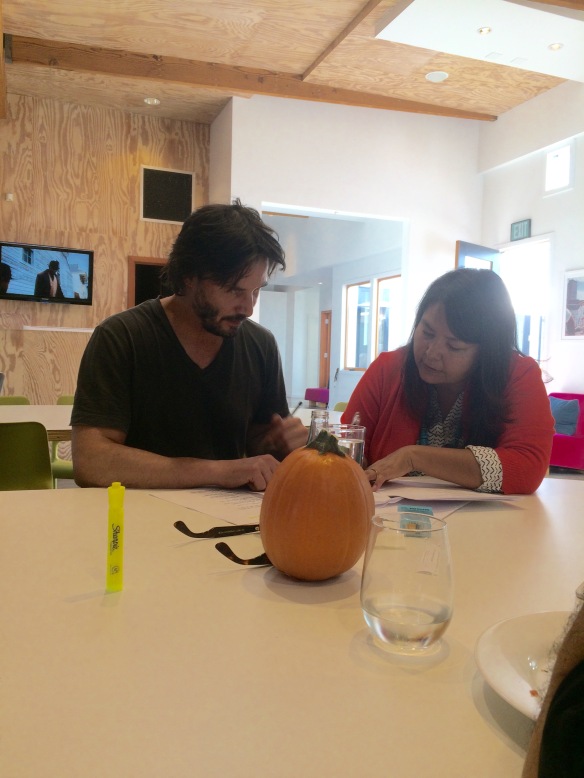
Keanu Reeves, Jennifer Wheeler, a pumpkin, a highlighter & my left arm
Finding a Navajo translator was comparatively difficult. A couple days after receiving Dr. Peterson’s email, I was in Scottsdale, AZ with my brother. I had previously scheduled the trip so that I could be in attendance at a book-signing featuring two of my favorite authors, as a birthday gift to myself. The event was held at the Poisoned Pen bookstore where many other local authors would regularly hold book-signings. While I was geeking out over meeting my favorite writing duo, as well as over my recent interaction with David Peterson, I was also stressed by the pressure to come through on an authentic Navajo translation. My brother urged me to ask the proprietors of the Poisoned Pen for any leads. And wouldn’t you know it, they had recently hosted a book-signing for the author of a Code Talkers book, and she was local. A morning of emails led to Jennifer Wheeler. We had struck gold. Jennifer had recently overseen Navajo translations of Star Wars: A New Hope and Finding Nemo, complete with voice-overs. There was probably nobody more qualified in the world.
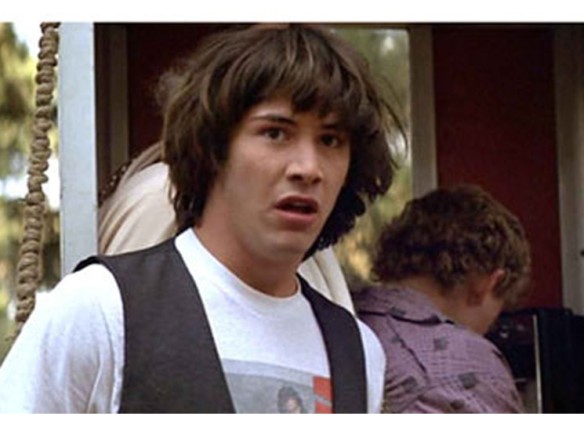
Keanu Reeves as Ted “Theodore” Logan in Bill & Ted’s Excellent Adventure
So it turns out that Navajo is a much more difficult language to translate and speak than I had anticipated. For instance, there are over a hundred vowel sounds. So even though the translation was in good hands, I would be imposing on Keanu Reeves one of the greatest vocal challenges he would ever undertake. Eventually I arranged to have Jennifer on hand during Keanu’s voice recording. Here’s what he had to record (phonetically):
Tsee /da / a / ko / ho / di / say / tsaa, / a / nee / di
aɫ / tso / n’ / shay / ch’aa / go
Echo Papa Romeo / do / do / chxih / da
Bi / nee / yay / bi / zhay / ho / lo / nee / bay / do / bish / go.
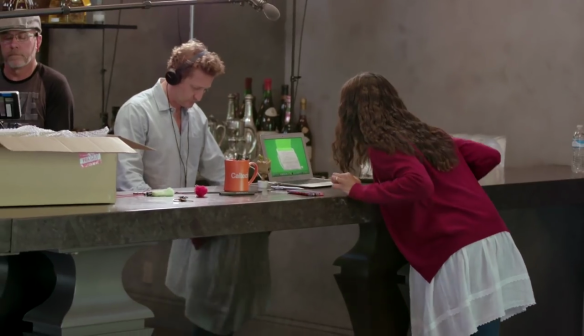
Alex Winter & Zoe Saldana hard at work
Filming Day
After months of planning and weeks of script revisions, filming finally happened at an opulent, palatial residence in the Hollywood Hills (big props to Shaun Maguire and Liana Kadisha for securing the location). Six cats. Three trainers. Lights. Cameras. Zube. Zoe Saldana actually showed up! Along with her sisters, Cinestar, and even John Cho! Spiros had gotten assurances from Simon Pegg that he would lend his name and golden voice so we were able to use the ridiculous “Simon’s Peggs” wood sign that we had crafted just for the shoot. Within a few busy hours we were wrapped. All the cats and props were packed and back in LA traffic, where we all seem to exist more often than not. Now the story was left to the fate of editing and post-production.
In Post
Unlike the circumstances involved with Anyone Can Quantum, for which there was a fast approaching debut date, Spiros and myself actually had time to be an active part of the post-production process. Alex Winter, Trouper Productions, and STITCH graciously involved us through virtually every step.
One thing that became quite apparent through the edits was the lack of a strong conclusion. Zoe’s story was designed to be somewhat open-ended. Although her character arc was meant to reach a conclusion with the decision to enter the Quantum Realm, it was clear that the short still needed a clear resolution.
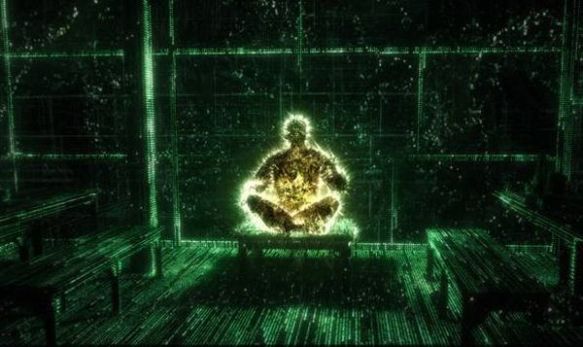
What Seraph looks like as code in the Matrix Reloaded
Through much debate and workshopping, Spiros and I finally arrived at bookend scenes that took advantage of Keanu Reeve’s emblematic representation of, and inescapable entanglement with, The Matrix. Our ultimate goal is to create stories that reflect the quantum nature of the universe, the underlying quantum code that is the fabric from which all things emerge, exist, and interact. So, in a way, The Matrix wasn’t that far off.
Language Is Fluid
LIQUi|> (“liquid”), or Language-Integrated Quantum Operations, is an architecture, programming language, and tools suite designed for quantum computing that is being developed by the Microsoft team at Quantum Architectures and Computation Group (or QuArC). Admittedly taking a few liberties, on Spiros’s advice I used actual LIQUi|> commands to create a short script that established a gate (or data structure) that I called Alice (which is meant to represent Zoe and her location), created an entanglement between Alice and the Tesseract, then teleported the Tesseract to Alice. You’ll notice that the visual and sound effects are ripped right from The Matrix.
This set up the possibility of adapting Neo’s famous monologue (from the end of the original Matrix) so we could hint that Zoe was somewhere adrift within the quantum code that defines the Quantum Realm. Yes, both Spiros and I were in the studio when Keanu recorded those lines (along with his lines in Dothraki and Navajo). Have I mentioned geeking out yet? An accompanying sequence of matrix code, or digital rain, had to be constructed that could accommodate examples of entanglement-related formulas. As you might have guessed, the equations highlighted in the digital rain at the end of the short are real, most of which came from this paper on emergent space (of which Spiros is a co-author).
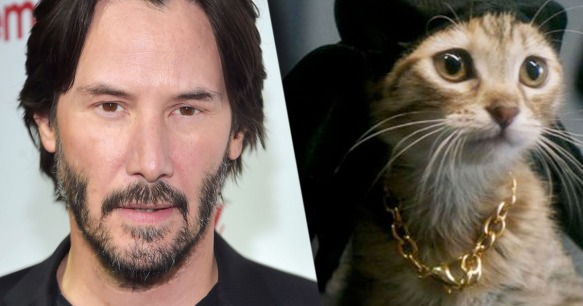
Keanu Reeves & Keanu
Listen To Your Friend Keanu Reeves. He’s A Cool Dude.
With only a few days left before our debut date, Simon Pegg, Stephen Hawking and Paul Rudd all came through with their voice-over samples. Everything was then stitched together and the color correction, sound balancing, and visual effects were baked into the final video and phew. Finally, and impossibly, through the collaboration of a small army of unique individuals, the script had become a short movie. And hopefully it has become something unique, funny, and inspiring, especially to any young women (and men) who may be harboring an interest in, or a doubt preventing them from, delving into the quantum realm.








